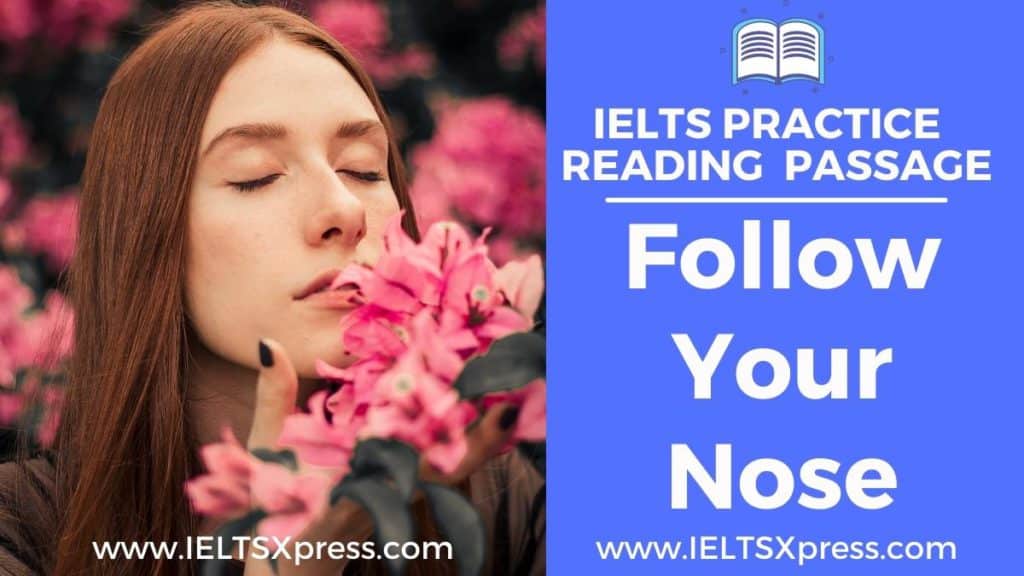Follow Your Nose IELTS Reading Passage with Answers
Reading Passage 2
You should spend about 20 minutes on Questions 14-26 which are based on Reading Passage 2 below.
Follow Your Nose
A
Aromatherapy is the most widely used complementary therapy in the National Health Service, and doctors use it most often for treating dementia. For elderly patients who have difficulty interacting verbally, and to whom conventional medicine has little to offer, aromatherapy can bring benefits in terms of better sleep, improved motivation, and less disturbed behaviour. So the thinking goes. But last year, a systematic review of health care databases found almost no evidence that aromatherapy is effective in the treatment of dementia. Other findings suggest that aromatherapy works only if you believe it will. In fact, the only research that has unequivocally shown it to have an effect has been carried out on animals.
B
Behavioural studies have consistently shown that odours elicit emotional memories far more readily than other sensory cues. And earlier this year, Rachel Herz, of Brown University in Providence, Rhode Island, and colleagues peered into people’s heads using functional Magnetic Resonance Imaging (fMRI) to corroborate that. They scanned the brains of five women while they either looked at a photo of a bottle of perfume that evoked a pleasant memory for them, or smelled that perfume. One woman, for instance, remembered how as a child living in Paris—she would watch with excitement as her mother dressed to go out and sprayed herself with that perfume. The women themselves described the perfume as far more evocative than the photo, and Herz and co-workers found that the scent did indeed activate the amygdala and other brain regions associated with emotion processing far more strongly than the photograph. But the interesting thing was that the memory itself was no better recalled by the odour than by the picture. “People don’t remember any more detail or with any more clarity when the memory is recalled with an odour,” she says. “However, with the odour, you have this intense emotional feeling that’s really visceral.”
C
That’s hardly surprising, Herz thinks, given how the brain has evolved. “The way I like to think about it is that emotion and olfaction are essentially the same things,” she says. “The part of the brain that controls emotion literally grew out of the part of the brain that controls smell.” That, she says, probably explains why memories for odours that are associated with intense emotions are so strongly entrenched in us, because the smell was initially a survival skill: a signal to approach or to avoid.
D
Eric Vermetten, a psychiatrist at the University of Utrecht in the Netherlands, says that doctors have long known about the potential of smells to act as traumatic reminders, but the evidence has been largely anecdotal. Last year, he and others set out to document it by describing three cases of post-traumatic stress disorder (PTSD) in which patients reported either that a certain smell triggered their flashbacks, or that smell was a feature of the flashback itself. The researchers concluded that odours could be made use of in exposure therapy, or for reconditioning patients’ fear responses.
E
After Vermetten presented his findings at a conference, doctors in the audience told him how they had turned this association around and put it to good use. PTSD patients often undergo group therapy, but the therapy itself can expose them to traumatic reminders. “Some clinicians put a strip of vanilla or a strong, pleasant, everyday odorant such as coffee under their patients’ noses, so that they have this continuous olfactory stimulation,” says Vermetten. So armed, the patients seem to be better protected against flashbacks. It’s purely anecdotal, and nobody knows what’s happening in the brain, says Vermetten, but it’s possible that the neural pathways by which the odour elicits the pleasant, everyday memory override the fear-conditioned neural pathways that respond to verbal cues.
F
According to Herz, the therapeutic potential of odours could lie in their very unreliability. She has shown with her perfume-bottle experiment that they don’t guarantee any better recall, even if the memories they elicit feel more real. And there’s plenty of research to show that our noses can be tricked, because being predominantly visual and verbal creatures, we put more faith in those other modalities. In 2001, for instance, Gil Morrot, of the National Institute for Agronomic Research in Montpellier, tricked 54 oenology students by secretly colouring a white wine with an odourless red dye just before they were asked to describe the odours of a range of red and white wines. The students described the coloured wine using terms typically reserved for red wines. What’s more, just like experts, they used terms alluding to the wine’s redness and darkness—visual rather than olfactory qualities. Smell, the researchers concluded, cannot be separated from the other senses.
G
Last July, Jay Gottfried and Ray Dolan of the Wellcome Department of Imaging Neuroscience in London took that research a step further when they tested people’s response times in naming an odour, either when presented with an image that was associated with the odour or one that was not. So, they asked them to sniff vanilla and simultaneously showed them either a picture of ice cream or of cheese, while scanning their brains in a fMRI machine. People named the smells faster when the picture showed something semantically related to them, and when that happened, a structure called the hippocampus was strongly activated. The researchers’ interpretation was that the hippocampus plays a role in integrating information from the senses— information that the brain then uses to decide what it is perceiving.
Questions 14-18
Reading Passage 2 has seven paragraphs, A-G
Choose the correct heading for paragraph A, C-E and G from the list of headings below.
Write the correct number i-ix in boxes 14-18 on your answer sheet.
14 Paragraph A
Example Answer
Paragraph B iv
Paragraph F v
15 Paragraph C
16 Paragraph D
17 Paragraph E
18 Paragraph G
List of Headings
i Remembering the past more clearly
ii Bringing back painful memories
iii Originally an alarm signal
iv The physical effects of scent versus image
v Checking unreliable evidence
vi Reinforcing one sense with another
vii Protection against reliving the past
viii The overriding power of sight and sound
ix Conflicting views
Questions 19 – 24
Look at the following findings (Questions 19-24) and the list of researchers
Match each finding with the correct researcher, A-D.
Write the correct letter, A-D, in boxes 19-24 on your answer sheet.
NB You may use any letter more than once.
19 Smell can trigger images of horrible events.
20 Memory cannot get sharper by smell.
21 When people are given an odour and a picture of something to learn, they will respond more quickly in naming the smell because the stimulus is stronger when two or more senses are involved.
22 Pleasant smells counteract unpleasant recollections.
23 It is impossible to isolate smell from visual cues.
24 The part of brain that governs emotion is more stimulated by smell than an image.
A Rachel Hertz
B Eric Vermetten
C Gil Morrot
D Jay Gottfried and Ray Dolan
Questions 25 – 26
Choose the correct letter, A, B, C or D.
Write your answers in boxes 25-26 on your answer sheet.
25 In the article, what is the opinion about the conventional method of aromatherapy?
A Aromatherapy is the use of essential oils extracted from plants.
B Evidence has proved that aromatherapy is effective in treating dementia.
C People who feel aromatherapy is effective to believe it is useful.
D Aromatherapy is especially helpful for elderly patients.
26 What is Rachel Hertz’s conclusion?
A The area of the brain which activates emotion has the same physiological structure as the part controlling olfaction.
B We cannot depend on smell, and people have more confidence insight and spoken or written words.
C Odours can recall real memories even after the perfume-bottle experiment.
D Smell has proved its therapeutic effect over a long time span.
Follow Your Nose IELTS Reading PassageAnswers
Practice with Expert IELTS Tutors Online
Apply Code "IELTSXPRESS20" To Get 20% off on IELTS Mock Test
14. ix
15. iii
16. ii
17. vii
18. vi
19. B
20. A
21. D
22. B
23. C
24. A
25. C
26. B
Also Check: Education Philosophy IELTS Reading Passage with Answers



